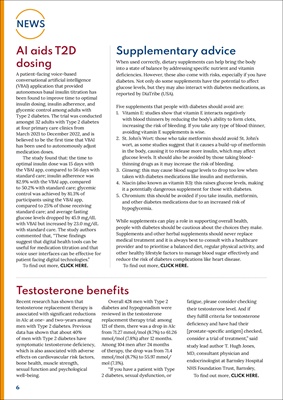
6
NEWS
AI aids T2D
dosing
A patient-facing voice-based
conversational artificial intelligence
(VBAI) application that provided
autonomous basal insulin titration has
been found to improve time to optimal
insulin dosing, insulin adherence, and
glycemic control among adults with
Type 2 diabetes. The trial was conducted
amongst 32 adults with Type 2 diabetes
at four primary care clinics from
March 2021 to December 2022, and is
believed to be the first time that VBAI
has been used to autonomously adjust
medication doses.
The study found that: the time to
optimal insulin dose was 15 days with
the VBAI app, compared to 56 days with
standard care; insulin adherence was
82.9% with the VBAI app, compared
to 50.2% with standard care; glycemic
control was achieved by 81.3% of
participants using the VBAI app,
compared to 25% of those receiving
standard care; and average fasting
glucose levels dropped by 45.9 mg/dL
with VBAI but increased by 23.0 mg/dL
with standard care. The study authors
commented that, "These findings
suggest that digital health tools can be
useful for medication titration and that
voice user interfaces can be effective for
patient facing digital technologies."
To find out more, CLICK HERE.
Supplementary advice
When used correctly, dietary supplements can help bring the body
into a state of balance by addressing specific nutrient and vitamin
deficiencies. However, these also come with risks, especially if you have
diabetes. Not only do some supplements have the potential to affect
glucose levels, but they may also interact with diabetes medications, as
reported by DiaTribe (USA).
Five supplements that people with diabetes should avoid are:
1. Vitamin E: studies show that vitamin E interacts negatively
with blood thinners by reducing the body's ability to form clots,
increasing the risk of bleeding. If you take any type of blood thinner,
avoiding vitamin E supplements is wise.
2. St. John's Wort: those who take metformin should avoid St. John's
wort, as some studies suggest that it causes a build-up of metformin
in the body, causing it to release more insulin, which may affect
glucose levels. It should also be avoided by those taking bloodthinning drugs as it
may increase the risk of bleeding.
3. Ginseng: this may cause blood sugar levels to drop too low when
taken with diabetes medications like insulin and metformin.
4. Niacin (also known as vitamin B3): this raises glucose levels, making
it a potentially dangerous supplement for those with diabetes.
5. Chromium: this should be avoided if you take insulin, metformin,
and other diabetes medications due to an increased risk of
hypoglycemia.
While supplements can play a role in supporting overall health,
people with diabetes should be cautious about the choices they make.
Supplements and other herbal supplements should never replace
medical treatment and it is always best to consult with a healthcare
provider and to prioritise a balanced diet, regular physical activity, and
other healthy lifestyle factors to manage blood sugar effectively and
reduce the risk of diabetes complications like heart disease.
To find out more, CLICK HERE.
Testosterone benefits
Recent research has shown that
testosterone replacement therapy is
associated with significant reductions
in A1c at one- and two-years among
men with Type 2 diabetes. Previous
data has shown that about 40%
of men with Type 2 diabetes have
symptomatic testosterone deficiency,
which is also associated with adverse
effects on cardiovascular risk factors,
bone health, muscle strength,
sexual function and psychological
well-being.
Overall 428 men with Type 2
diabetes and hypogonadism were
reviewed in the testosterone
replacement therapy trial: among
121 of them, there was a drop in A1c
from 71.27 mmol/mol (8.7%) to 61.26
mmol/mol (7.8%) after 12 months.
Among 104 men after 24 months
of therapy, the drop was from 71.4
mmol/mol (8.7%) to 55.97 mmol/
mol (7.3%).
"If you have a patient with Type
2 diabetes, sexual dysfunction, or
fatigue, please consider checking
their testosterone level. And if
they fulfill criteria for testosterone
deficiency and have had their
[prostate-specific antigen] checked,
consider a trial of treatment," said
study lead author T. Hugh Jones,
MD, consultant physician and
endocrinologist at Barnsley Hospital
NHS Foundation Trust, Barnsley,
To find out more, CLICK HERE.